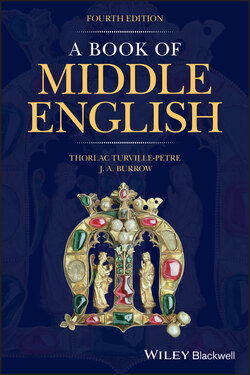Читать книгу A Book of Middle English - J. A. Burrow - Страница 52
4.5.7 Irregular Verbs
ОглавлениеSo‐called ‘Preterite‐Present’ verbs have a present tense that was in origin a past tense, and have formed a new past tense. The commonest are cunnen, ‘to know how to’ (modern ‘can’), mahen, ‘to be able, have the ability, may’, moten, ‘to be allowed to, compelled to’ (its past tense gives modern ‘must’), schulen, ‘to have to, shall’, and witen, ‘to know’. In the language of the Ancrene Wisse they have these forms:
| present indicative | ||||||
| sg. | 1 | can | mei | mot | schal | wat |
| 2 | canst | maht | most | schalt | wast | |
| 3 | can | mei | mot | schal | wat | |
| pl. | cunnen | mahen | moten | schule(n) | witen | |
| subjunctive | ||||||
| sg. | cunne | mahe | mote | schule | wite | |
| past indicative | ||||||
| sg. | 1, 3 | cuðe | mahte | moste | schulde | wiste |
| (conjugation continues as for weak verbs: 4.5.4) |
The verb willen, ‘to want, wish, will’, has the following forms in the language of the Ancrene Wisse and Gawain:
| Ancrene Wisse | Gawain | ||
| present indicative | |||
| sg. | 1 | wulle | wyl(le), wol |
| 2 | wult | wyl(t) | |
| 3 | wule | wyl | |
| pl. | wulleð | wyl | |
| subjunctive | |||
| sg. | wulle | wyl | |
| pl. | wullen | wyl | |
| past indicative | |||
| sg. | 1, 3 | walde | wolde |
There are negative forms for all parts of the verb, illustrated by wolle thow, nulle thow, ‘whether you wish it or not’ (subjunctive), 7b/153. The verb may be run together with a personal pronoun, particularly in Southern texts (see 4.3.2).
